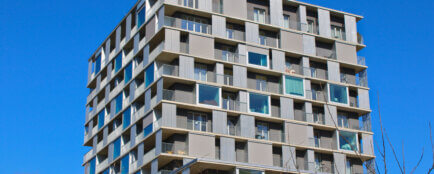Creation of residential units
The formation of the JVU is logically preceded by the formation of the housing units themselves, i.e. simply put, the flats. Their maximum number is not limited by law, but there must logically be at least two in the house. Their definition occurs either:
- By the construction of a new house under a building contract – here there must be a contractual obligation of the parties to create the units and at the same time the house is at least at a stage of construction that it already has exterior walls and a roof structure. The builders remain co-owners until the creation of the housing unit. However, it is also possible to register the units under construction in the Land Registry; there is no need to wait for the final form. The unit becomes spatially separated as soon as it is enclosed by perimeter walls.
- Dividing a shared ownership house into units by declaration of the owner – if the whole house and all its parts are owned by one owner, it is usually practical to divide it into units, as this will make it easier and more efficient to dispose of the house: some units can be sold, others rented out and others perhaps occupied or used as offices. Even if the owner wants to use the whole house at any given time, it is worth thinking in this way with an eye to the future. The division into units is done by the will of the owner (or co-owners). If a single person is the owner, then he or she also becomes the owner of all the units in the house.
Are you solving a similar problem?
Looking for a lawyer for a condominium or housing cooperative?
We will provide you with a lawyer for SVJ or BD for 6 or 12 months. He or she will be available at any time to resolve thorny legal problems, represent you in court or with the authorities, take minutes of membership meetings or assemblies and help you with any legal issue. All this for a predetermined price.
I want to get legal help
- When you order, you know what you will get and how much it will cost.
- We handle everything online or in person at one of our 6 offices.
- We handle 8 out of 10 requests within 2 working days.
- We have specialists for every field of law.
- Conversion of the house into co-ownership units – if the house is co-owned or held in community of property, it is possible to conclude an agreement on separation from co-ownership or on dissolution and division of co-ownership, or an agreement between the spouses on the change of the scope of the community of property or on the division of the community of property. This agreement may be the basis for registration in the Land Register.
- Court decision – in this case, the court decision replaces the declaration of the owner of the building. The court may decide in similar situations as in the previous case, i.e. separation from co-ownership or dissolution and settlement of co-ownership (either of the co-owners may file a petition), or in the case of reduction of SJM or settlement of SJM, unless there is an agreement.
When is it necessary to establish a unit owners’ association?
According to the law, the obligation to establish an HOA arises when there are at least five units in the building and at least four of them are owned by four different persons. It is also possible to establish a unit owners’ association voluntarily in a building with less than five units, but all unit owners must agree to such establishment.
Our law firm was contacted by Mr Filip, who until now owned a three-storey house in Prague 6 with his family. The children were unofficially promised that each of them would own one apartment. One of the descendants wanted to take advantage of his promised right and sell the apartment he occupied and buy a house. The family contacted us for a legal solution.
We prepared deeds of gift for Mr. Filip for the three housing units that he gave to his children as promised. Subsequently, one of the sons was able to start the sale of his apartment. At the moment of transferring the flats to the owners’ children, however, the legal condition for the establishment of the JVU came into being, which we also helped the family to establish, draw up tailor-made articles of association and send the registration form to the registration court. This proved to be necessary before the actual sale of the flat. Although there is no penalty for failure to establish an HOA, it is possible to establish an HOA at a later date, but if the establishment of the HOA is not proven, the ownership of the unit being transferred will not be registered in the Land Registry.
Previously, the HOA could be established automatically by law, but such possibilities are no longer allowed by law. As of 1 July 2020, it is not possible to establish an HOA when taking stock of the owner’s declaration or when concluding a construction contract. The establishment of an SVJ under the new Civil Code is thus conditional on the active step of the owners, who must establish the association themselves and register it. The law now provides for the following possible variants of establishment:
- establishment at a constituent meeting of unit owners,
- incorporation by approval of the statutes by all unit owners outside the meeting,
- incorporation by a single owner of all the units.
We have to distinguish the establishment of the HOA, which is a separate phase from phase 1, which is the establishment of the unit owners’ association. The formation of the HOA occurs by registration in the register of the unit owners’ association on the date on which the HOA was registered. The new Civil Code thus makes a clear distinction between the establishment itself and the moment when the formation of the HOA under the new Civil Code occurs by formal entry in the register.
In order to register a unit owners’ association, a form must be filled in and sent together with all attachments to the relevant registration court.
The establishment of an HOA under the new Civil Code is subject to the fulfilment of the statutory conditions, in particular the number of residential units and their distribution among several owners.
Tip for article
Tip: We have discussed the requirements of the articles of association and the method of their approval in a separate article.
Establishment at the constituent meeting of unit owners
At the constituent meeting, all unit owners gather and the actual incorporation takes place by approving the bylaws. This requires approval by a majority vote of all unit owners. A notary public must be present at the constituent meeting to certify the decision to adopt the bylaws as well as the proper conduct of the meeting by notarial deed.
Establishment by agreement of all owners
The owners may agree to establish the association outside the constituent meeting. However, even in such a case, the approval of the statutes is required and, as this is an approval outside the meeting, it must be agreed by all unit owners in the building. Here, too, the cooperation of a notary is necessary, as the statutes must be in the form of a notarial deed. The owners then express their approval by signing a document that is part of the notarial deed.
Establishment of a housing cooperative
If you are one of the founding members, you should know that at least three members are needed to establish a housing cooperative. A housing cooperative is established by a constituent meeting of the members of the cooperative, which must be recorded by a notary. This must contain (among other things) two essential things:
- a list of the founding members of the cooperative and
- an undertaking to pay the basic membership contribution of each member of the cooperative.
As a legal entity, a housing cooperative is formed once the cooperative is registered in the commercial register. This is done after the constituent meeting of the cooperative on a special form available on the website of the Ministry of Justice (justice.cz). You must then attach the following documents:
- the notarial minutes of the constituent members’ meeting,
- an affidavit of the members of the statutory body (or other bodies) of the cooperative and consent to their entry in the Commercial Register,
- a document certifying the legal reason for the use of the premises where the head office of the housing cooperative is located,
- proof of payment of the specified part of the membership contribution.
The cooperative flats are owned by the cooperative itself, not by the individual members of the cooperative. The flats are leased to them on the basis of an indefinite lease agreement for a cooperative flat. They then acquire a cooperative share and must fulfil the deposit obligation and start paying rent. The rent pays for the management of the building and the operation of the cooperative, among other things.
Proper registration in the register is crucial, because it is only through this step that the formation of the SVJ is legally recognised under the new Civil Code.
Summary
The formation of an HOA under the new Civil Code is no longer automatic, but only through registration in the register of the unit owners’ association. The obligation to establish an HOA arises if there are at least five units in the building and they are owned by at least four different persons. Establishment may take place at a constituent meeting of the owners, by agreement of all the owners or by a decision of the sole owner of all the units. To be successfully registered, it is necessary to approve the articles of association, secure notarial registration and file an application with the registration court. If the HOA is not properly established, this can complicate the transfer of units and the management of the building.
Frequently Asked Questions
When does the obligation to establish an SVJ arise under the new Civil Code?
The obligation to establish an HOA arises if there are at least five residential units in the house and at least four of them are owned by four different persons. Once this condition is met, the owners must ensure the establishment of the HOA and subsequent registration in the register. Until then, it is not possible, for example, to transfer the units without difficulty or to manage the common parts of the house effectively.
What is the process of establishing a JVU under the new Civil Code?
According to the new Civil Code, the formation of an HOA is only established by registration in the register of the community of owners maintained by the relevant registration court. The establishment of the HOA itself is only the first step – the legal entity comes into existence only on the date of registration in the register. The proposal must be accompanied by the articles of association, the notarial deed and other statutory annexes.
What are the options for establishing a unit owners' association?
There are three ways to establish a community of owners:
-
at a constituent meeting of unit owners,
-
by approval of the bylaws by all owners outside the meeting,
-
by resolution of the sole owner of all the units.
In all cases, notarial registration and subsequent registration is required, without which the HOA does not legally exist.
Is it possible to set up a community of apartment owners voluntarily?
Yes. An HOA can also be established voluntarily if there are fewer than five units in the building. In this case, however, all owners must agree to the establishment. A voluntary HOA makes sense especially where the owners want to set clear rules for managing the building, financing repairs and deciding on common parts.
What happens if the owners fail to comply with the obligation to establish a JVU?
Although the law does not impose a direct financial penalty, in practice there may be serious complications. Without proof of the formation of the JVU, the transfer of the unit cannot usually be registered in the Land Registry, which may block the sale. Furthermore, there are uncertainties in the administration of the building, in the management of the repair fund and in the possibility of concluding contracts with administrators or contractors. It is therefore advisable to establish a unit owners’ association as soon as possible after the legal conditions have been met.




